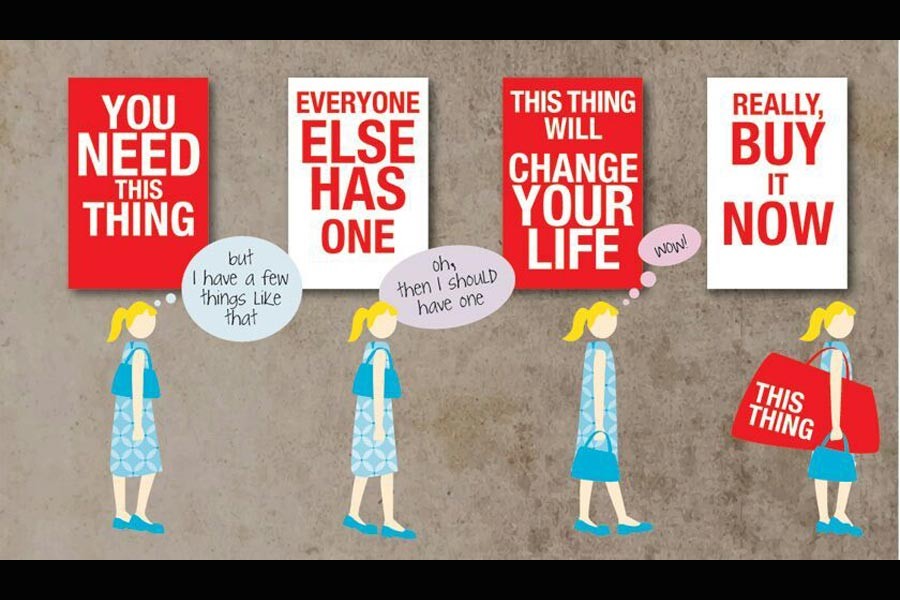Fuelling consumerism is a business strategy adopted by industries, manufacturing firms and corporate houses or commercial ventures. Products or gadgets unheard of by a generation are the most sought-after elements or implements for the immediate next generation. But not everyone is financially well off to enjoy many of the implements easing life and living. Technology has progressed by leaps and bounds but not the economic condition of all peoples everywhere in the world. Countries industrially advanced with indigenous resources to back up technological development have had to narrow the gap fast between different social segments in order to give the share of the pie.
It is thus the living standard in the West gradually improved, pacifying the voices of discontent. In countries like Bangladesh where poverty had long been endemic, the late economic take-off has presented an unusual dilemma. The technological revolution has brought at people's doors all the latest wonders of innovation without preparing entire society for those. The majority of people are yet to break the cycle of poverty and acquire many of the gadgets and implements for comfort. But manufacturers would like to lure more and more people to become proud owners of their wonder gadgets.
Still much as the manufacturers may try, if economy does not reach a certain level only a select segment has to be made a target of marketing drive. Today, manufacturers of electric and electronic gadgets are in a fierce competition with each other to capture a share of the market. They are making concessional offers in order to attract consumers.
Usually fresh service holders or couples starting family life are the target group. Young people belonging to this group do not earn a lot for large savings each month but have a steady income. However, their incomes leave small savings for them to pay instalments if they purchase brand luxury items.
Usually such business thrives in cities and towns. Paid in instalments with no interests involved, the opportunity proves handy for those who cannot manage the handsome amount of money at a time. At zero per cent interest, the payment does not prove to be a burden on consumers. The compulsion of regular payment of instalments also acts as an incentive for them to improve their financial status.
There are others who receive bank loans in order to acquire the objects of their dreams. Cars, flats or land -all falling in the category of big budgets - can be owned with bank loans. But unless the income is quite hefty, it is impossible to think of such large credits. Because the middle class in this country is growing, the demand for such credits too are picking up. Although consumer credit at this level rose 28.22 per cent last year, the disbursement is still confined to a very limited number of people.
Just imagine if most of the electronic gadgets could feature in most homes --irrespective of village or towns, what would be the size of the economy of Bangladesh! Do 10 per cent households in Bangladesh have such gadgets? Perhaps not. There indeed lies the problem with economies in developing countries like Bangladesh marked by widespread discrimination. Distributive economic justice is what is indeed lacking here. Even very few village homes have electric fans let alone a television and fridge. Companies may be highly competitive but they cannot reach such gadgets, like cell phones, to everyone. Prices of silicon chips-based gadgets could be brought down to the minimum but the same is not true for other household gadgets.
This leaves innovators and policymakers with the choices of either using such chips for running those household devices or raising the purchasing capacity of the people at the bottom half of society.


